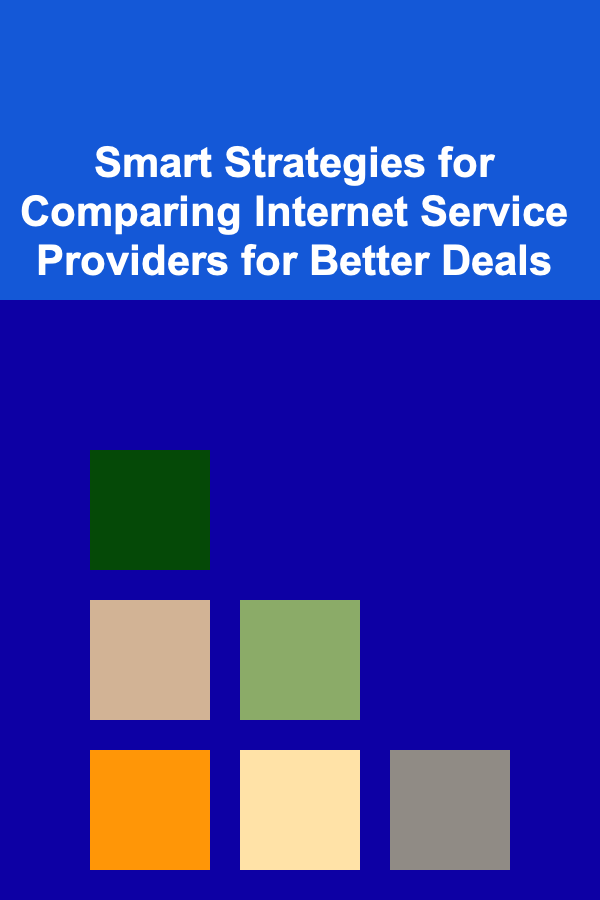
Smart Strategies for Comparing Internet Service Providers for Better Deals
ebook include PDF & Audio bundle (Micro Guide)
$12.99$7.99
Limited Time Offer! Order within the next:

When it comes to selecting an Internet Service Provider (ISP), the number of options can often feel overwhelming. With different providers offering a variety of packages, pricing, and features, it's easy to fall into the trap of choosing the most convenient or the one that seems the cheapest at first glance. However, making an informed decision requires more than just a quick glance at the pricing tables. To secure the best deal for your needs, it's essential to compare the offerings of various ISPs strategically.
This actionable guide provides a comprehensive approach to help you effectively compare Internet Service Providers and choose the best deal that suits your specific needs, preferences, and budget.
Understand Your Usage Requirements
Before diving into the details of different ISPs, it's crucial to evaluate your own internet usage needs. Identifying your typical usage patterns will help you understand what type of plan and speed you truly need. Without this understanding, you may end up overpaying for unnecessary services or opting for a plan that doesn't meet your needs.
Key Usage Factors to Consider:
-
Number of Devices: How many devices will be connected to the internet at the same time? This includes smartphones, laptops, tablets, smart TVs, and other connected devices. More devices typically require a faster and more stable connection.
-
Type of Activities: Different online activities require different amounts of bandwidth. For example:
- Streaming Video: Watching Netflix, YouTube, or 4K content requires higher speeds.
- Online Gaming: Gaming generally requires a low-latency, stable connection rather than super-fast speeds.
- Remote Work or Video Conferencing: For work-related tasks or frequent Zoom meetings, you'll need reliable upload speeds.
- Web Browsing and Social Media: These activities generally require lower speeds, but they are still important to consider.
-
Future Growth: Consider your future needs. If you plan to increase the number of connected devices or switch to higher-demand activities, it might be worth opting for a higher-speed plan.
Assess the Types of Internet Connections Available in Your Area
Not all ISPs offer the same types of internet connections, and the type of connection available can significantly impact your experience. The four main types of internet connections you're likely to encounter are:
- Fiber-Optic: Known for the highest speeds and the most reliable service, fiber-optic connections offer symmetrical upload and download speeds. Fiber-optic is the best option for most high-bandwidth activities, such as streaming, gaming, and heavy work-related tasks.
- Cable: Cable internet offers high speeds and is widely available. However, speeds can be inconsistent during peak usage hours due to shared bandwidth with neighbors.
- DSL: Digital Subscriber Line (DSL) is generally slower and offers lower bandwidth than fiber or cable, but it may be the only available option in rural or underserved areas. DSL connections often have higher latency compared to fiber-optic connections.
- Satellite: This is a viable option for those living in rural areas without access to cable or fiber-optic broadband. While satellite internet can provide coverage in remote areas, it is often associated with higher latency and lower speeds compared to other connection types.
- Fixed Wireless: This is a type of broadband internet that relies on radio signals. It's available in certain areas where cable or fiber isn't feasible, but similar to satellite internet, it may come with restrictions in terms of speed and reliability.
The Takeaway:
Choosing the right type of connection can make a significant difference in your overall internet experience. Fiber-optic is the ideal option, but if it's unavailable, cable is often a solid alternative. Always consider speed, latency, and reliability before making a final decision.
Speed vs. Cost: What's the Right Balance?
Speed is one of the most advertised features of internet packages, but more speed doesn't always mean better value. It's important to balance the speed you need with the price you're willing to pay.
Key Speed Considerations:
- Download Speed: This is the speed at which data is transferred from the internet to your device. For activities like streaming, downloading large files, and online gaming, high download speeds are crucial. A speed of at least 25 Mbps is recommended for HD streaming, and 50 Mbps or more for 4K streaming.
- Upload Speed: Upload speed is important for activities like video calls, uploading large files to the cloud, and streaming content (such as on Twitch or YouTube). A minimum of 3 Mbps is suggested for video calls, but for more frequent or high-quality uploads, you may need higher speeds.
- Symmetrical Speeds: Some providers, especially fiber-optic ISPs, offer symmetrical download and upload speeds, which is particularly important if you work from home or require consistent data transfer in both directions.
How to Find the Right Speed:
- For casual web browsing, email, and social media, speeds between 10-25 Mbps are generally sufficient.
- For streaming HD video, video conferencing, and gaming, look for speeds between 50-100 Mbps.
- For multiple users or 4K streaming, consider plans that offer speeds of 100 Mbps or more.
Cost Implications:
Higher-speed plans tend to cost more, but it's important to ask whether you truly need those speeds. Be mindful of the overage charges for exceeding data limits (if applicable) and weigh these costs against the extra speed you're purchasing.
Compare Bundling Options
Some ISPs offer bundling options, where you can combine your internet plan with other services like cable TV, home phone, or even home security. Bundling can often lead to a more cost-effective solution, but it's important to evaluate whether the additional services truly offer value.
Pros of Bundling:
- Discounts: Many ISPs offer discounts for bundling services together, potentially reducing your monthly cost.
- Convenience: Managing one bill and dealing with a single provider for multiple services can simplify your life.
Things to Keep in Mind:
- Bundled Services May Not Always Be Necessary: If you don't watch cable TV or use a landline phone, bundling services you don't need could be a waste of money.
- Limited Choices: Some ISPs require you to commit to a bundle to access certain speeds or deals, so it's essential to assess whether you're paying for more than you actually need.
Consider Customer Service and Reputation
An often overlooked but crucial factor in choosing an ISP is customer service. Even if a provider offers the best speeds and rates, poor customer service can lead to frustration when things go wrong.
What to Look For in ISP Customer Service:
- 24/7 Availability: Make sure the provider offers round-the-clock customer support, especially if you rely heavily on the internet for work or other time-sensitive tasks.
- Online Support and Chat Options: A well-maintained support portal or live chat option can help resolve minor issues quickly without requiring a phone call.
- Response Time and Resolution Rate: Look for reviews or customer ratings on how quickly the company resolves issues and how effective their solutions are.
- Service Guarantees: Some ISPs offer uptime guarantees or promises to resolve issues within a certain time frame.
The Takeaway:
You might be willing to pay a little extra for a provider with reliable customer support, especially if you're prone to technical difficulties. Researching customer reviews and independent ratings from sources like Consumer Reports or Trustpilot can provide a clearer picture of a provider's service quality.
Examine Hidden Fees and Contracts
ISPs may advertise attractive introductory rates, but these prices often come with hidden fees or introductory periods that increase after a certain time. Be sure to read the fine print and inquire about potential additional charges.
Common Hidden Fees:
- Installation Fees: Some ISPs charge for installation or equipment setup.
- Equipment Rental Fees: Renting a modem or router from the ISP can add monthly costs. If possible, consider purchasing your own modem or router to save money in the long term.
- Data Overages: Some plans may have data caps, and exceeding those limits could result in additional charges.
- Early Termination Fees: If you decide to cancel your contract before the term is over, many ISPs charge hefty early termination fees. Always check the contract length and cancellation policy before signing up.
Check for Promotions and Trial Periods
Many ISPs offer introductory promotions that can significantly reduce your costs in the first few months. However, be sure to check what happens after the promotional period ends to avoid sticker shock.
Trial Periods:
Some ISPs provide trial periods, allowing you to test the service for a month or two to determine whether it meets your expectations. Take advantage of this opportunity to test the speed, reliability, and overall experience before committing long-term.
Conclusion
Comparing ISPs is not a one-size-fits-all task. It requires a strategic approach where you assess your needs, evaluate the types of connections available, compare speeds and pricing, and consider customer service and hidden fees. By taking the time to research your options thoroughly, you can find an ISP that offers the best combination of speed, reliability, and value for your specific requirements.
Remember, the goal is not simply to find the cheapest option, but the one that offers the best value for your internet needs.

How to Clean Your Home Using Natural Ingredients Only
Read More
How to Use AR for Contextual Information Display
Read More
Strategic Supply Chain Management: Navigating Complex Networks
Read More
How To Understand Robot Design Principles
Read More
How to Find Government Job Openings
Read More
How to Discuss a Film's Dialogue and Script
Read MoreOther Products

How to Clean Your Home Using Natural Ingredients Only
Read More
How to Use AR for Contextual Information Display
Read More
Strategic Supply Chain Management: Navigating Complex Networks
Read More
How To Understand Robot Design Principles
Read More
How to Find Government Job Openings
Read More